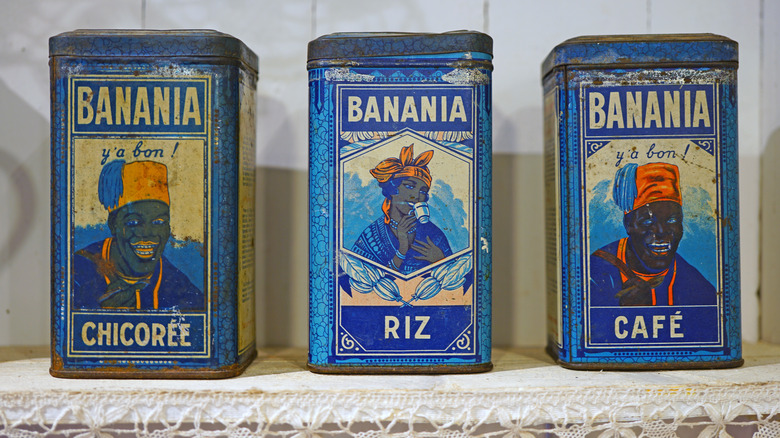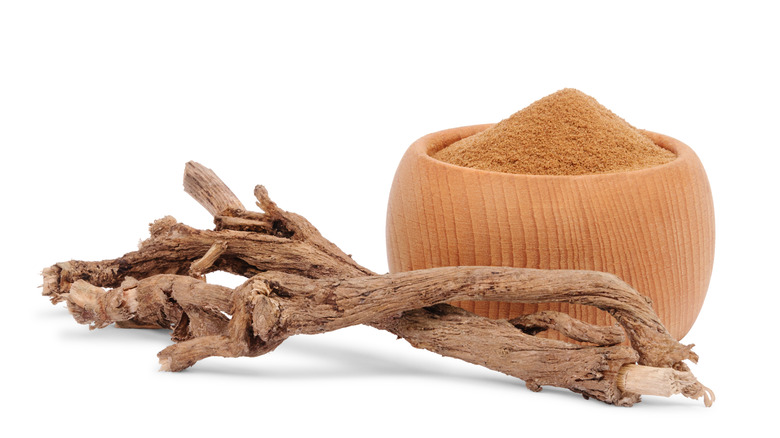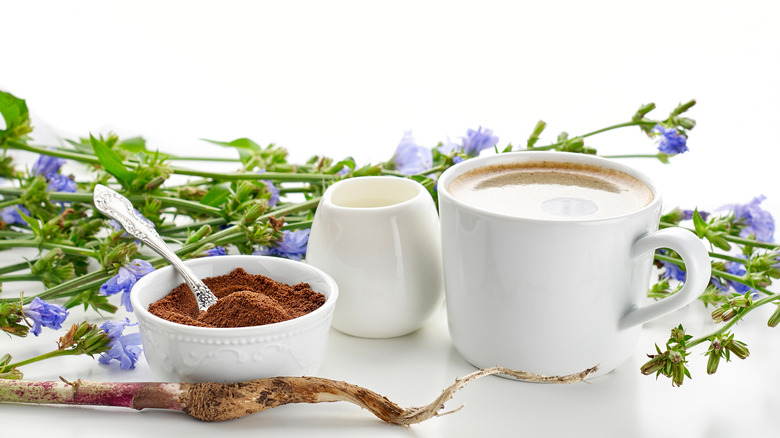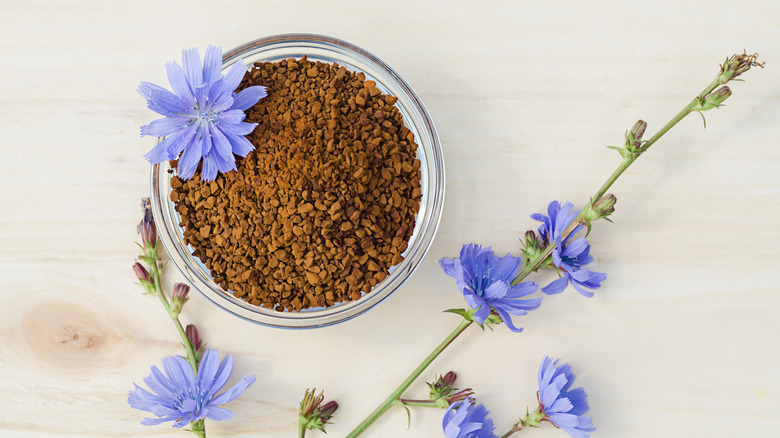The Truth About Chicory Root Coffee
It's pretty much impossible to imagine a New Orleans breakfast without a mug of chicory coffee. The slightly sweet aroma and smooth toasty flavor profile are the perfect pairing for warm, doughy beignets. But what exactly is chicory coffee? And more importantly, why is so specifically tied to the South?
Simply put, chicory coffee is a beverage made by brewing roasted chicory roots. According to Healthline, chicory (cichorium intybus) is a member of the dandelion family, which includes other edible flowering plants like radicchio, frisee, and endive. In the wild, it sprouts eye-catching blue, white, and purple flowers, and has long taproots that grow underground like beets (via Brandeis). Nearly all parts of the chicory plant are edible, but the roots are known for developing a rich, chocolatey taste when dried and roasted that can deepen the flavor profile of any dessert or beverage. Since chicory roots don't contain any caffeine, fans of chicory coffee tout its ability to offer a similar experience as drinking a cup of joe without the buzz. However, it's also commonly mixed into ground coffee.
Ask anyone from New Orleans about chicory and they'll tell you it is so much more than a caffeine-free coffee substitute. Rather, it's a special drink that's as much a part of the city's unique culinary history as jazz, muffalettas, and the Civil War. Here's everything you need to know about chicory coffee.
Chicory coffee was created out of necessity
Long before chicory coffee was associated with New Orleans, it was used in 19th century France by people who wanted stretch their regular coffee supply (via Smithsonian Magazine). At the time, nearly all of France's coffee beans came from England, so when military leader Napoleon Bonaparte decided to block international imports, the French people had no choice but to look for an alternative (via Community Coffee). They found a solution by roasting and steeping chicory root, which grew abundantly and provided a cheaper alternative to the beans they couldn't access.
This practice followed French settlers to the Americas after the Louisiana Purchase. However, chicory coffee didn't gain popularity in the US until the height of the Civil War, when the Union blocked the port of New Orleans, preventing all of their own coffee imports. To compensate, soldiers and poor southerners alike started mixing coffee grinds with other sweet foods like cornmeal and acorns to make whatever rations they had on hand last. Like the French, they found that chicory was the best at providing a coffee-like taste for a much cheaper price. As one 1862 Charleston Mercury newspaper put it, "In these blockade times, when none but the wealthy can indulge in pure coffee, the chicory will be found to answer all its purposes" (via University of Texas at Tyler).
Even though the embargo ended, that Louisiana tradition is still going strong. Many New Orleans coffee houses, such as the 160-year-old Cafe Du Monde and 155-year-old Morning Call, still use chicory root in their morning brew.
Chicory coffee offers unique health benefits
As much as we hate to admit it, caffeine dependency is a very real problem. If left untreated, it can lead to depression, sleep struggles, headaches, and more. But if you're not ready to kick your coffee habit just yet, switching to chicory might just be the solution. It has the same earthy flavor of regular coffee without the heart pounding buzz of caffeine, provided the brew you make isn't a blend mixed with other coffee beans.
That's not the only benefit of drinking this traditional New Orleans style beverage. Per Healthline, chicory root offers a low-calorie, low-carb source of inulin, a special type of fiber typically found in high carbohydrate foods like bananas, wheat, and yams. A natural laxative, inulin has been shown to reduce constipation and improve overall digestion. This is why you'll find chicory root on the ingredient list in many health foods like granola bars (via Bakers Journal). On top of that, Healthline notes inulin has been linked to improved blood sugar regulation and reducing the overall risk for colon cancer.
But the drink isn't for everyone
Of course, just because chicory is a great source of health benefits, it doesn't mean you're in the clear to go crazy and guzzle New Orleans style coffee like it's water. Consuming too much inulin fiber at one can potentially cause your digestive system to go into overdrive, which can lead to uncomfortable symptoms such as bloating, flatulence, and abdominal pain. If you don't already regularly consume products with inulin fiber, Healthline suggests starting with small quantities and scaling up from there, as well as drinking lots of water throughout the day.
Moreover, drinking chicory in place of regular coffee (or even traditional decaf) to reduce caffeine intake isn't for everyone. As Healthline points out, people with ragweed or pollen allergies should be aware that it can potentially trigger reactions like swelling in the lips and throat. Additionally, pregnant women should drink it in moderation because some science suggests it may cause uterine contractions.
Making chicory coffee at home
Whether you're looking to cut your caffeine intake or simply try something new, you'll be delighted to learn that making a cup of chicory coffee is as easy as brewing a regular cup of joe. To make your own batch, simply add "ground" chicory to your regular coffee grinds. Driftaway Coffee suggests combining at a ratio of one part chicory to every two or three parts coffee, though you can adjust this based on your taste preference. Chicory root is more water soluble than coffee beans, which means you don't need to use as much of it to extract its flavor. Next, brew it as you would with regular coffee, using a drip coffee maker or French press. Just be careful not to let it steep for too long, since the chicory can become quite bitter.
The end result should be a beverage that tastes slightly nutty, with subtle notes of burnt sugar. You can also add cinnamon and other spices, or better yet, top it with frothy milk for a delectable morning treat. Pair with your favorite pastry (ideally a beignet!) for an experience that will mentally transport you to the streets of NOLA.
Looking for something better suited for a hot summer day? Try steeping ground chicory in chilled water overnight. In the morning, strain the liquid into a pitcher and add one can of sweetened condensed milk and a bit of vanilla for a luxuriously creamy cold brew that'll make you forget Starbucks even exists (via Bon Appetit).
Where to buy chicory coffee
Chicory root may have once been a staple ingredient throughout the 19th century, but finding it today is a bit like going on a treasure hunt. This is mostly because there aren't many manufacturers in the US that process chicory for brewing. In fact, if you're lucky enough to come across ground chicory in a grocery store, it's likely in the form of a coffee blend imported from France (via Smithsonian Magazine).
Currently, the most well-known brand on the US market is Cafe Du Monde's chicory and coffee blend, which comes in a 15 ounce tin adorned with the New Orleans coffee shop's iconic logo (via Whole People). Outside of The Big Easy, you can generally find this blend for sale in specialty stores, as well as inside the gift shops at Disneyland's French Quarter. Of course, as chicory coffee has grown in popularity, other brands have taken notice. Trendy coffee chain Blue Bottle, for instance, sells a ready-to-drink chicory-infused cold brew in select stores.
Now, if you're looking for roasted chicory root without any coffee added to it, you're probably better off ordering it online. Of course, you could also try making your own homemade batch for brewing. It's a time-consuming process that requires foraging for the plants, mincing the roots, roasting them until golden brown, and finally, running them through a grinder (via Homegrounds). But if you have the time, it might be worth the result.





